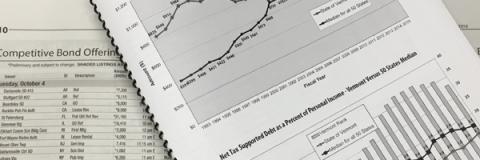BRATTLEBORO — Vermont State Treasurer and Brattleboro native Mike Pieciak was in town Thursday to talk about a new plan to establish a revolving loan fund that he hopes will help ease the state's housing crunch.
If Vermont is going to continue to grow its economy, increase access to vital care and services, and help people struggling with homelessness, it needs to build more places to live, he said.
"The single biggest thing we can do is encourage more housing to promote workforce development and promote economic growth," said Pieciak.
The "10 Percent for Vermont" program, enacted by the Legislature and signed into law in 2014 by Gov. Peter Shumlin, gives the State Treasurer's Office the ability to invest up to 10 percent of the state's cash on hand in the form of loans with rates between 1 and 2 percent.
The legislation allows the money to be used for housing, energy efficiency or climate mitigation, with an overarching goal of social equity, said Pieciak.
"It could apply to community projects, like a library or community center," he said. "But our focus, our main focus is housing. There's just nothing in my estimation that comes close to having the kind of economic impact that more housing would have for the state of Vermont."
The state has $2 billion in its bank account right now. Before the pandemic, that account held $400 million.
Much of that increase is because of federal COVID relief funds, he said, but increased tax revenue has contributed, as well.
The 10 Percent for Vermont program will make available, through a competitive bid process, $100 million to housing projects, such as those championed by Windham & Windsor Housing Trust and the 300-unit community proposed for the Winston Prouty Campus in Brattleboro.
"The Vermont Housing Finance Authority has said we need 30,000 to 40,000 new units in the state," said Pieciak, acknowledging $100 million won't go very far on its own to solve the crisis.
It can cost on average between $150,000 to $200,000 to build a one-bedroom apartment in Brattleboro.
An organization like Winston Prouty will need to build "a funding stack" of money from different sources to achieve its goal. The treasurer's program can be a piece of that stack, said Pieciak.
But it's not just about money, he said. To allow a necessary housing boom to happen, the state needs to revise Act 250, and municipalities need to take a look at how their zoning is restricting growth.
Support our journalism. Subscribe today. →
"The purpose of Act 250 is to protect our environment, protect our landscape," said Pieciak. "But the single greatest thing we can do in Vermont, in my opinion, to reduce our carbon footprint is to build more dense housing in places like Brattleboro and Bennington."
Growing up the son of an accountant, Pieciak just happened to love collecting and analyzing baseball statistics.
"Data, mathematics and numbers, I've always had a comfort level with them," he said.
After graduating from Northfield Mount Hermon School in Gill, Mass., he studied political science at Union College in Schenectady, N.Y., before going to the University of Miami School of Law.
He practiced mergers and acquisitions law in New York City before returning to Vermont to join the Vermont Department of Financial Regulation and was appointed commissioner in 2016. During the pandemic, Pieciak and his team at DFR led the state’s COVID-19 modeling to review data and analyze trends and how the pandemic might affect the state's economy, revenue and the health effects on the state's most vulnerable people.
"The pandemic suspended everybody," said Pieciak, who lives in Winooski. "We all had to stop and think about our lives. Where did we want to live? How did we want to live? Where do we want to work? What kind of work do we want to do? And what we want for our state, ourselves and our families."
Many people retired but stayed in their homes, said Pieciak.
"That is a situation where a member of the workforce has gone away, but they're still taking up a house," he said. "The flipside of that is individuals that moved to Vermont, they now were able to bring their job with them. They're paying a ton for a house, and they're paying for it in cash. They're taking the house off the market without adding the job to the local workforce. Those two phenomenon are putting even more pressure in the housing market, and even more pressure on people that earn their living in Vermont, driving up the cost of living."
With housing hard to find, or too expensive, the amenities people rely upon can't be provided, because there aren't enough people in the workforce, he said.
"Even things like increased medical wait times and less access to health care when there's fewer providers at a hospital because those providers are turning down job opportunities, because they can't find housing. That's having an impact on all of us."
Pieciak is also advocating for VTSaves, a bipartisan public retirement initiative that provides employees not currently covered by a workplace retirement plan access to one at no cost to their employers.
"Data shows 95 percent of individuals who do not have access to a workplace retirement account are not saving anything for retirement, so we are trying to change that," he said.





